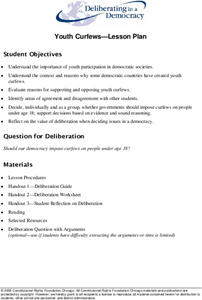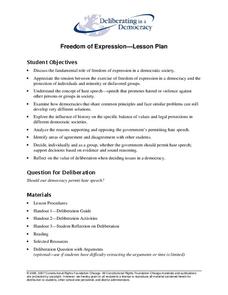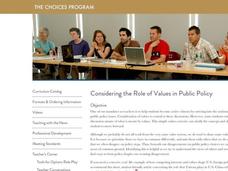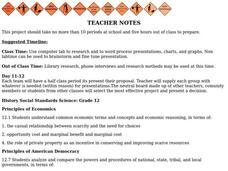Constitutional Rights Foundation
The Election of 1912
The Election of 1912: an election with four competitive opponents. Pupils get to know the candidates with informative reading passages that provide context to the election. Then, the class engages in a debate and answers questions as one...
Carolina K-12
Making First Vote Your Vote: Designing a Schoolwide Election
Encourage pupils to design an election plan for the entire school. They participate in a Board of Elections, create polling rules, discuss election controversies, write questions about the issues, run the election through an online...
Deliberating in a Democracy
Youth Curfews
Don't stay out too late! Scholars analyze the need for youth curfews in a democratic society. They examine primary documents, case studies, and short video clips to form their opinions and take a position on the issue. Holding a class...
Deliberating in a Democracy
Freedom of Expression
Should democracies include hate speech as a protected right? Scholars analyze the rights found under the First Amendment to the Constitution through researching evidence. Freedom of expression becomes the focal point of the...
Museum of Tolerance
Documents That Shape Society
The Bill of Rights is a foundational document of American democracy, much like the Nuremberg Laws were a foundational document of the Reichstag of Nazi Germany. But that's where their similarities end. Engage high schoolers in a...
Center for Civic Education
Historical Analysis of Constitutional Amendments
Each of the 27 Amendments to the U.S. Constitution were adopted within specific economic, political, social or cultural, and international contexts. As part of their Constitution Day/Week studies, seniors investigate these factors for...
Our White House
The Our White House Inauguration Celebration Kit for Kids!
Get the youngest American citizens involved in the presidential election and inauguration with a set of social studies activities. Focusing on the history of presidential inauguration ceremonies, learners draft their own poems, design...
National Constitution Center
Creating Your Own Town Hall Poster
Middle and high schoolers are walking into a world rife with strong political viewpoints and vocal opinions. Help to prepare them for controversial discussions with a lesson in which they choose, research, and learn more about a...
Indiana Department of Education
Voting: It's Not a Spectator Sport!
Why is it important to vote? Who is eligible to vote? Why is it that some eligible voters do not vote? Class members conduct interviews with adults and other school mates before researching the eligibility requirements for their state,...
Core Knowledge Foundation
Thanksgiving with the Pilgrims
Teach kindergartners about the First Thanksgiving with a series of lessons about the Pilgrims' journey to the New World. As they practice handwriting, CVC words, reading comprehension, and fun Thanksgiving songs, they learn about what...
Brown University
Considering the Role of Values in Public Policy
Strong opinions come from deeply held values. Young citizens explore the values that are most important to them in a class discussion and activity. As they prioritize a list of values cards that include freedom, justice, and democracy,...
Museum of Tolerance
The Pursuit of Democracy and Diversity: The Trial of Pro-Social Injustice in Historical Documents and Accounts
Class members investigate The Indian Removal Act of 1830, U.S. Theft of Mexican Territory Timeline, and President Abraham Lincoln’s letter to Horace Greeley, 1862, and then conduct a mock trial of each of these documents to determine...
Museum of Tolerance
The Role of Citizens in a Participatory Democracy
Groups research participatory democracies and compare the role and rights of citizens in ancient history with those in recent U.S. history. Guided by a series of questions, individuals compose a persuasive essay in which they discuss the...
Museum of Tolerance
Citizenship Then and Now: Comparing Ancient Rome and Contemporary American Society
Class members research citizenship in Ancient Rome and in the United States and use the provided graphic organizers to compare the rights and responsibilities of citizens in these two democracies.
Kids Voting USA
Kids Voting USA: K-2 Classroom Activities
Address both social studies and critical reading skills with a resource dedicated to the voting process, the American democracy, and the ability to evaluate information in order to develop a stance on an issue. Each themed activity set...
City University of New York
Women's Suffrage and World War I
Democracy cannot exist where not everyone has equal rights. Discuss the state of democracy and women's suffrage during World War I with class discussions, debates, and primary source analysis, in order for class members to connect with...
Curated OER
ANTICIPATORY SET
Learners are be able to analyze primary sources (photographs and speeches) and write a definition of American Democracy. They are shown a photograph of Martin Luther King Jr. by Ben Fernandez, students are asked what is happening in the...
National Endowment for the Humanities
Walt Whitman to Langston Hughes: Poems for a Democracy
Explore the idea of democratic poetry. Upper graders read Walt Whitman, examining daguerreotypes, and compare Whitman to Langston Hughes. They describe aspects of Whitman's I Hear America Singing to Langston Hughes' Let America Be...
Benjamin Franklin Tercentenary
Classroom Constitutional Convention
Students investigate the eight phrases that comprise the Preamble to the U.S. Constitution to determine its principles and purpose. Their own Constitutional Convention is convened to craft a preamble for their school's governance.
Curated OER
Researching American Democracy
Students compare Watergate and the Clinton/Lewinsky scandal. In this U.S. Constitution lesson, students define vocabulary terms and read articles regarding the impeachment process. Students respond to questions that require them to...
Curated OER
Government: The Mystery Epidemic
Students are able to identify some roles of government in dealing with the prevention and treatment of skin cancer. They are able to list two reasons why the occurrence of skin cancer in youths has increased.
Curated OER
Introduction to Selected Documents from the Roxcy Bolton Collection
Students listen to a guided imagery exercise that takes them back to 1969. They brianstorm ideas to try to discover why they would not be allowed to sit at an empty table at a Burdines lunch counter in 1969.
They read letters about the...
Curated OER
Building a Nation
Eighth graders identify the main ideas of the U.S. Declaration of Independence. They read and discuss text, read and summarize a section of the Declaration of Independence in small groups, and write a paper on why the colonists felt it...
Curated OER
American Democracy
Twelfth graders represent a specific interest in the business community and must present a plan that benefit the community and present the least amount of danger to the community. They must convince the city fathers that their venture is...

























